《研究生英语阅读教程》(基础级)第三版课文译文
研究生英语阅读教程(基础级3版)课文09和其翻译
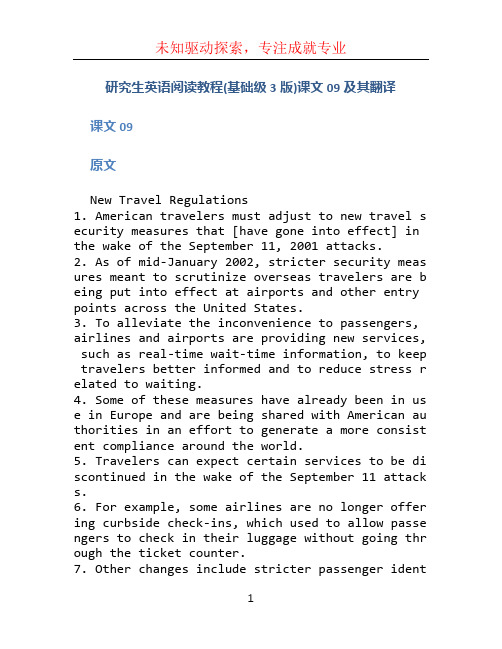
研究生英语阅读教程(基础级3版)课文09及其翻译课文09原文New Travel Regulations1. American travelers must adjust to new travel s ecurity measures that [have gone into effect] in the wake of the September 11, 2001 attacks.2. As of mid-January 2002, stricter security meas ures meant to scrutinize overseas travelers are b eing put into effect at airports and other entry points across the United States.3. To alleviate the inconvenience to passengers, airlines and airports are providing new services, such as real-time wait-time information, to keep travelers better informed and to reduce stress r elated to waiting.4. Some of these measures have already been in use in Europe and are being shared with American au thorities in an effort to generate a more consist ent compliance around the world.5. Travelers can expect certain services to be di scontinued in the wake of the September 11 attack s.6. For example, some airlines are no longer offer ing curbside check-ins, which used to allow passe ngers to check in their luggage without going thr ough the ticket counter.7. Other changes include stricter passenger identifications' requirements and more thorough inspec tions of checked luggage.翻译新旅行规定1. 在2001年9月11日袭击事件之后,美国旅行者必须适应新的旅行安全措施。
(完整版)研究生英语阅读教程第三版课文Lesson1
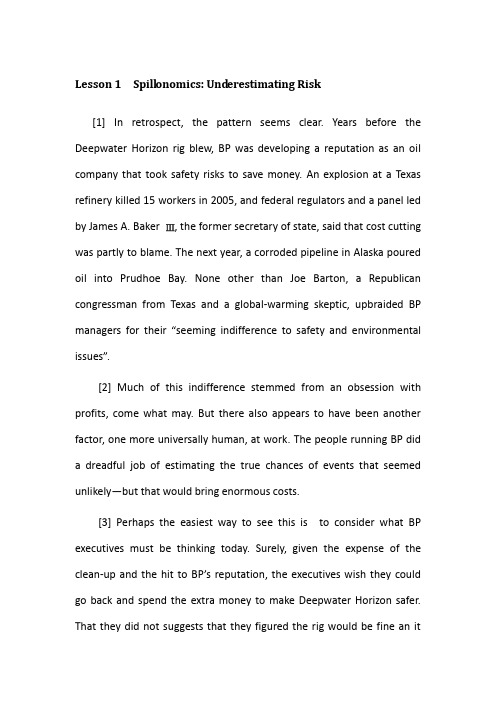
Lesson 1 Spillonomics: Underestimating Risk[1] In retrospect, the pattern seems clear. Years before the Deepwater Horizon rig blew, BP was developing a reputation as an oil company that took safety risks to save money. An explosion at a Texas refinery killed 15 workers in 2005, and federal regulators and a panel led by James A. BakerⅢ, the former secretary of state, said that cost cutting was partly to blame. The next year, a corroded pipeline in Alaska poured oil into Prudhoe Bay. None other than Joe Barton, a Republican congressman from Texas and a global-warming skeptic, upbraided BP managers for their “seeming indifference to safety and environmental issues”.[2] Much of this indifference stemmed from an obsession with profits, come what may. But there also appears to have been another factor, one more universally human, at work. The people running BP did a dreadful job of estimating the true chances of events that seemed unlikely—but that would bring enormous costs.[3] Perhaps the easiest way to see this is to consider what BP executives must be thinking today. Surely, given the expense of the clean-up and the hit to BP’s reputation, the executives wish they could go back and spend the extra money to make Deepwater Horizon safer. That they did not suggests that they figured the rig would be fine an itwas.[4]For all the criticism BP executives may deserve, they are far from the only people to struggle with such low-probability, high-cost events. Nearly everyone does. “These are precisely the kinds of events that are hard for us as humans to get our hands around and react to rationally, ”Robert N. Stavins, an environmental economist at Harvard, says. We make two basic—and opposite—types of mistakes. When an event is difficult to imagine, we tend to underestimate its likelihood. This is the proverbial black swan. Most of the people running Deepwater Horizon probably never had a rig explode on them. So they assumed it would not happen , at least not to them.[5] Similarly, Ben Bernanke and Alan Greenspan liked to argue, not so long ago, that the national real estate market was not in a bubble because it had never been in one before. Wall Street traders took the same view and built mathematical models that did not allow for the possibility that house prices would decline. And may home buyers signed up for unaffordable mortgages, believing they could refinance or sell the house once its price rose. That’s what house prices did, it seemed.[6]On the other hand, when an unlikely event is all too easy to imagine, we often go in the opposite direction and overestimate the odds. After the 9/11 attacks, Americans canceled plane trips and took to the road. There were no terrorist attacks in this country in 2002, yet theadditional driving apparently led to an increase in traffic fatalities.[7]When the stakes are high enough, it falls to government to help its citizens avoid these entirely human errors. The market, left to its own devices, often cannot do so. Yet in the case of Deepwater Horizon, government policy actually went the other way. It encouraged BP to underestimate the odds of a catastrophe.[8] In a little-noticed provision in a 1990 law passed after the Exxon Valdez spill, Congress capped a spiller’s liability over and above cleanup costs at $7500 million for a rig spill. Even if the party is on the hook for only $7500 million. (In this instance, BP has agreed to waive the cap for claims it deems legitimate. ) Michael Greenstone, an M.I.T. economist who runs the Hamilton Project in Washington, says the law fundamentally distorts a company’s decision making. Without the cap, executives would have to weigh the possible revenue from a well against the cost of drilling there and the risk of damage. With the cap, they can largely ignore the potential damage beyond cleanup costs. So they end up drilling wells even in places where the damage can be horrific, like close to a shoreline. To put it another way, human frailty helped BP’s executives underestimate the chance of a low-probability, high-cost event. Federal law helped them underestimate the costs.[9] In the wake of Deepwater Horizon, Congress and Obama administration will no doubt be tempted to pass laws meant to reducethe risks of another deep-water disaster. Certainly there are some sensible steps they can take, like lifting the liability cap and freeing regulators from the sway of industry. But it would be foolish to think that the only risks we are still underestimating are the ones that have suddenly become salient.[10]The big financial risk is no longer a housing bubble. Instead, it may be the huge deficits that the growth of Medicare, Medicaid and Social Security will cause in coming years—and the possibility that lender will eventually become nervous about extending credit to Washington. True, some economists and policy makers insist the country should not get worked up about this possibility, because lenders have never soured on the Unite States government before and show no signs of doing so now. but isn’t that reminiscent of the old Bernanke-Greenspan tune about the housing market?[11]Then, of course, there are the greenhouse gases that oil wells ( among other things) send into the atmosphere even when the wells function properly. Scientists say the buildup of these gases is already likely to warm the planet by at least three degrees over the next century and cause droughts, storms and more ice-cap melting. The researcher’s estimates have risen recently, too, and it is also possible the planet could get around 12 degree hotter. That kind of could flood major cities and cause parts of Antarctica to collapse.[12]Nothing like that has ever happened before. Even imagining it is difficult. It is much easier to hope that the odds of such an outcome are vanishingly small. In fact, it’s only natural to have this hope. But that doesn’t make it wise.。
研究生英语阅读教程第三版(基础级)翻译答案Lesson16
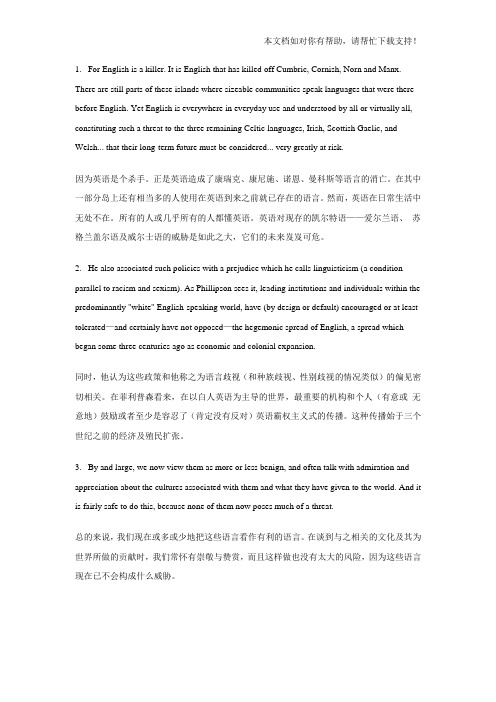
1.For English is a killer. It is English that has killed off Cumbric, Cornish, Norn and Manx. There are still parts of these islands where sizeable communities speak languages that were there before English. Yet English is everywhere in everyday use and understood by all or virtually all, constituting such a threat to the three remaining Celtic languages, Irish, Scottish Gaelic, and Welsh... that their long-term future must be considered... very greatly at risk.因为英语是个杀手。
正是英语造成了康瑞克、康尼施、诺恩、曼科斯等语言的消亡。
在其中一部分岛上还有相当多的人使用在英语到来之前就已存在的语言。
然而,英语在日常生活中无处不在。
所有的人或几乎所有的人都懂英语。
英语对现存的凯尔特语——爱尔兰语、苏格兰盖尔语及威尔士语的威胁是如此之大,它们的未来岌岌可危。
2.He also associated such policies with a prejudice which he calls linguisticism (a condition parallel to racism and sexism). As Phillipson sees it, leading institutions and individuals within the predominantly "white" English-speaking world, have (by design or default) encouraged or at least tolerated—and certainly have not opposed—the hegemonic spread of English, a spread which began some three centuries ago as economic and colonial expansion.同时,他认为这些政策和他称之为语言歧视(和种族歧视、性别歧视的情况类似)的偏见密切相关。
研究生英语阅读教程基础级第三版
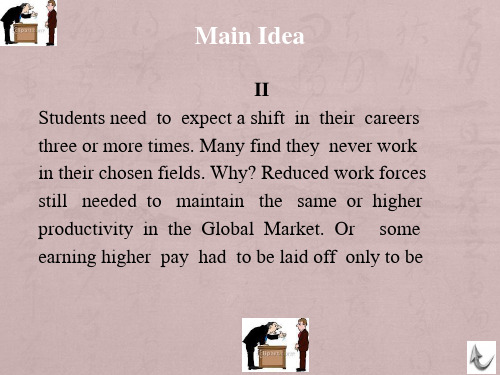
Main Idea
replaced by part time or contract workers for less pay. Some government agencies have downsized, some from funding cuts. Now graduates need to learn how to fit into this new work world.
2) n [u] the ideas, feelings, or opinions that are most important to a particular group of people or have the greatest influence on them at a particular time
●这家餐馆有酒类销售执照。 This restaurant is licensed to sell alclhol.
●药剂师获准开处方配药。 The pharmacist is licensed to dispense drugs.
Language Points
2. pulse n [c] singular 1) the regular beat that can be felt, for example at your wrist, as your heart pumps blood around your body ; heartbeat
7. query n (line 2, para.5) 1) a question, especially one asking for information or
expressing a doubt about sth
● 我们的助理很乐意回答诸位的疑问。 Our assistants will be happy to answer your queries.
研究生英语阅读教程(基础级3版)课文复习资料翻译1-12单元完整版
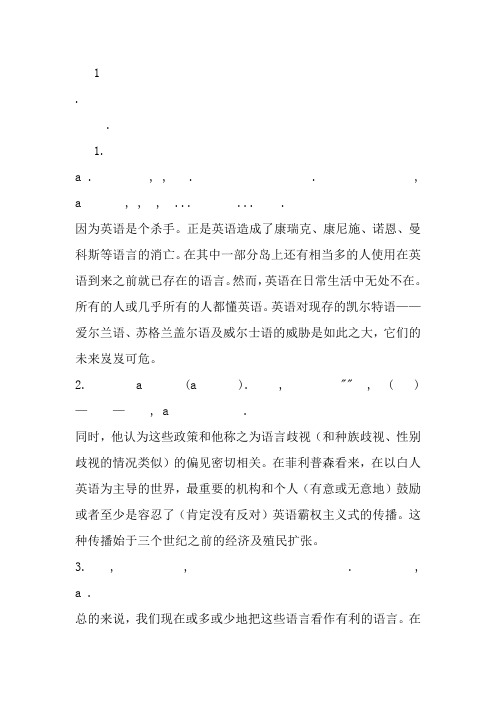
1..1.a . , , . . ,a , , , ... ... .因为英语是个杀手。
正是英语造成了康瑞克、康尼施、诺恩、曼科斯等语言的消亡。
在其中一部分岛上还有相当多的人使用在英语到来之前就已存在的语言。
然而,英语在日常生活中无处不在。
所有的人或几乎所有的人都懂英语。
英语对现存的凯尔特语——爱尔兰语、苏格兰盖尔语及威尔士语的威胁是如此之大,它们的未来岌岌可危。
2. a (a ). , "" , ( ) —— , a .同时,他认为这些政策和他称之为语言歧视(和种族歧视、性别歧视的情况类似)的偏见密切相关。
在菲利普森看来,在以白人英语为主导的世界,最重要的机构和个人(有意或无意地)鼓励或者至少是容忍了(肯定没有反对)英语霸权主义式的传播。
这种传播始于三个世纪之前的经济及殖民扩张。
3. , , . ,a .总的来说,我们现在或多或少地把这些语言看作有利的语言。
在谈到与之相关的文化及其为世界所做的贡献时,我们常怀有崇敬与赞赏,而且这样做也没有太大的风险,因为这些语言现在已不会构成什么威胁。
4. a . , a , a , a .然而,许多人把英语看成是一件幸事。
在此,我暂且不谈任何世界语言所具有的明显优势,例如广泛的通信网,强大的文化传媒体系,及强有力的文化教育机构。
5. , , , .讲英语的南非英国后裔并不强烈反对种族隔离政权,而黑人反对力量,其成员讲多种语言,在初期软弱无力且缺乏组织。
6. 's .这一象征表明这种世界通用语的使用者应充分发掘这一幸事为我们带来的好处,同时尽能避免招来灾难。
21 . I , I .苹果公司发生的这些事情丝毫的没有改变这一点。
我被驱逐了,但是我仍然钟爱我所做的事情。
2 a , ..因为,作为一个成功者的负重感被作为一个创业者的轻松感觉所重新代替, 没有比这更确定的事情了。
这让我觉得如此自由, 进入了我生命中最有创造力的一个阶段。
3 (可怕的好可怕糟糕的 ) i . a . 't . 这个良药的味道实在是太苦了,但是我想病人需要它。
研究生英语阅读教程第三版lesson1翻译

1.英语是个杀手。
正是英语造成了康瑞克,康尼施,诺恩和曼科斯语的消亡。
这些岛上仍然有相当多的群体使用英语到来之前就已经存在的语言。
然而英语在日常生活中无处不在,所有人或者说几乎所有人都懂英语,英语对现存的三种凯尔特语——爱尔兰语,苏格兰盖尔语和威尔士语的威胁如此之大,以至于它们的未来岌岌可危。
2.同时,他认为这样的政策带有蔑视色彩,他称之为语言歧视(和种族歧视和
性别歧视类似)。
在菲利普森看来,在占主导的白人英语的世界里,处于领导地位的机构和个人(有意或无意的)鼓励或至少是容忍——当然没有反对——英语霸权主义的传播。
它开始于三世纪前,为了经济和殖民的扩张。
3.总的来说,我们现在或多或少认为它们是有利的,而且经常以崇敬和赞赏的
心态去谈论与它们相关的文化和它们为世界所做的贡献。
这么做也没有什么风险,因为这些语言现在已不构成什么威胁。
4.然而许多人把英语看做一种福。
在此,我暂且不谈世界上任何一种语言都具
有的明显的优势,例如广泛的交流网络,强大的文化传媒体系,以及强有力地文化教育机构。
5.讲英语的英国血统的南非人并不强烈反对种族隔离政权,并且由多种语言成
员构成的黑人反对力量,起初很脆弱,同时也缺乏组织。
6.这一象征表明世界通用语的使用者应充分发掘这个福给我们带来的好处,同
时也要尽可能的去避免招致灾祸。
研究生英语阅读教程(基础级版)课文及其翻译
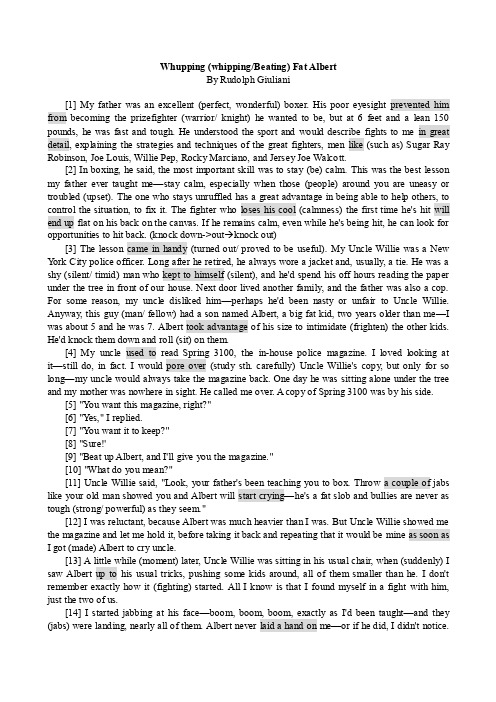
Whupping (whipping/Beating) Fat AlbertBy Rudolph Giuliani[1] My father was an excellent (perfect, wonderful) boxer. His poor eyesight prevented him from becoming the prizefighter (warrior/ knight) he wanted to be, but at 6 feet and a lean 150 pounds, he was fast and tough. He understood the sport and would describe fights to me in great detail, explaining the strategies and techniques of the great fighters, men like (such as) Sugar Ray Robinson, Joe Louis, Willie Pep, Rocky Marciano, and Jersey Joe Walcott.[2] In boxing, he said, the most important skill was to stay (be) calm. This was the best lesson my father ever taught me—stay calm, especially when those (people) around you are uneasy or troubled (upset). The one who stays unruffled has a great advantage in being able to help others, to control the situation, to fix it. The fighter who loses his cool (calmness) the first time he's hit will end up flat on his back on the canvas. If he remains calm, even while he's being hit, he can look for opportunities to hit back. (knock down->out knock out)[3] The lesson came in handy (turned out/ proved to be useful). My Uncle Willie was a New Y ork City police officer. Long after he retired, he always wore a jacket and, usually, a tie. He was a shy (silent/ timid) man who kept to himself (silent), and he'd spend his off hours reading the paper under the tree in front of our house. Next door lived another family, and the father was also a cop. For some reason, my uncle disliked him—perhaps he'd been nasty or unfair to Uncle Willie. Anyway, this guy (man/ fellow) had a son named Albert, a big fat kid, two years older than me—I was about 5 and he was 7. Albert took advantage of his size to intimidate (frighten) the other kids. He'd knock them down and roll (sit) on them.[4] My uncle used to read Spring 3100, the in-house police magazine. I loved looking at it—still do, in fact. I would pore over (study sth. carefully) Uncle Willie's copy, but only for so long—my uncle would always take the magazine back. One day he was sitting alone under the tree and my mother was nowhere in sight. He called me over. A copy of Spring 3100 was by his side.[5] "Y ou want this magazine, right?"[6] "Y es," I replied.[7] "Y ou want it to keep?"[8] "Sure!'[9] "Beat up Albert, and I'll give you the magazine."[10] "What do you mean?"[11] Uncle Willie said, "Look, your father's been teaching you to box. Throw a couple of jabs like your old man showed you and Albert will start crying—he's a fat slob and bullies are never as tough (strong/ powerful) as they seem."[12] I was reluctant, because Albert was much heavier than I was. But Uncle Willie showed me the magazine and let me hold it, before taking it back and repeating that it would be mine as soon asI got (made) Albert to cry uncle.[13] A little while (moment) later, Uncle Willie was sitting in his usual chair, when (suddenly) I saw Albert up to his usual tricks, pushing some kids around, all of them smaller than he. I don't remember exactly how it (fighting) started. All I know is that I found myself in a fight with him, just the two of us.[14] I started jabbing at his face—boom, boom, boom, exactly as I'd been taught—and they (jabs) were landing, nearly all of them. Albert never laid a hand on me—or if he did, I didn't notice.His nose started bleeding, a shiner was rising (swelling) nicely (noticeably), and finally he started to cry. Then he turned and ran home (ad.).[15] I went home, too, and told my mother. She slapped me hard (heavily) across the face. "Apologize right now, and I'm going to tell your father tonight. He's going to give you a real beating."[16] "I don't want to apologize," I mumbled. "He started it." For that I got a second slap.[17] Albert was still crying, and I begrudgingly (reluctantly) said, "I'm sorry, Albert." My mother made (forced) us (to) shake hands and ordered me to stay in for the rest of the day. I glanced at my uncle, and thought, at least he could give me the darn magazine. But I didn't give him up. I just went slowly up to my room. About 20 minutes later, his daughter, my cousin (/=nephew/ niece) Evangeline, came up. She was carrying his copy of Spring 3100. "My dad wanted you to have this," she said. "Since you have to stay in all day." I looked out the window. Uncle Willie was still there, under his tree, and he gave me a nod—as much for keeping my mouth shut, I knew, as for whipping Albert.[18] My father came home that evening, and my mother told him what had happened. I could hear them (talk) talking in the room next door. It was his fault, my mother said, for teaching me to box. He should give me a licking (beating) I'd never forget. My father came up to me, but before he could adopt (~ed child) a suitable face (expression) of disapproval, he blurted, "You whipped Albert? God almighty (mighty=powerful)! He's two years older than you, and 25 pounds heavier!" (mighty=powerful)[19] Standing up to bullies might sound like a glib call to be macho (brave), but the truth is it takes a toll on you. One of the best reasons to let bullies know you won't back down (withdraw/ retreat) from a fight is so (difficult) that it doesn't get to (express) that point (meaning). That's not just a theory—there were many times (cases/ often) in my administration when an early confrontation led to far less fighting (struggle) down the road (in the direction). Here's an example. At about 8:40 p. m. on Wednesday, July 17, 1996, TWA Flight 800 crashed into the Atlantic Ocean just off (away from) Long Island. All 230 on board the Paris-bound 747, which had taken off from Kennedy International Airport, were killed. My community response team and I got to the scene (site)(scenery) within an hour and set up an assistance (help) center at the Ramada Plaza Hotel near the airport to provide aid (help) and counseling (comfort) to family members. [boarding school][20] When we got (arrived) there, the first thing we tried to do was (to) obtain (get) the manifest so (that) we could be sure who had been on the plane. Airlines are required by law to compile a complete list of passengers on international flights, including full names, passport information, and emergency phone contact numbers. This information is supposed (thought to (=should) be made available within three hours of any crash. In this case, by 11:30 p. m., TWA said 229 people were aboard. By noon the next day, they were saying the number was 228. Later in the afternoon, they put the number at 230. I repeatedly demanded an accurate passenger list from TWA but was given every excuse why the airline couldn't produce one. I sensed (felt) something was up (was happening) when I received a call about 4 a. m. from the CEO of the airline, Jeffrey Erickson, from a plane heading for Kennedy. I told him that I needed the manifest. He said we would talk when he got to New Y ork, that he wanted to "liaise" (contact) with me. I don't agree to liaise with people I haven't met. But then I thought, well, maybe I shouldn't be so judgmental (subjunctive) based on the use of one word.[21] By the next day, I was exasperated. I felt we were getting the runaround. When Ericksonfinally showed up (appeared), he addressed the families and the press at Kennedy Airport, and spoke for under (less than) a minute. He refused to take a single question. He added nothing to what we already knew; there was certainly nothing to liaise about.[22] On behalf of the families of the passengers—and with an eye toward future disasters—I decided to make my anger known. On several national shows and on all the local channels, I criticized TWA for caring more about covering (hiding) itself than promptly notifying (informing) suffering family members. On Friday, I recorded my weekly WABC radio show from the Ramada and said, "The upper management of TWA incompetently handled (delt with) the notification process for the families. That continues to be exacerbated (worse) by their not telling the truth about what happened."[23] Three months later, Erickson resigned (sign + nature->signature). But that wasn't the point (key). In a city the size of New Y ork, disasters are inevitable (=unavoidable). I wanted leaders of companies involved in any future disaster to understand just what was expected of them—clear, honest, timely communication. By refusing to keep quiet about TWA's behavior, I made sure (granter) the consequences of putting corporate needs ahead of human suffering were understood. (1, 388 words).OUT THE AUTHORRudolph William Louis "Rudy" Giuliani III (born May 28, 1944) served as the Mayor of New Y ork from January 1, 1994 through December 31, 2001.EXERCISESI . Reading ComprehensionAnswer the following questions or complete the following statements.1. Rudolph Giuliani's father was _____.A. a successful boxing prizefighterB. able to win fights with techniquesC. very tall and strongD. well informed of boxing2. The strategies and techniques of a great fighter that Rudolph Giuliani learned from his father _____.A. were soon practicedB. were later used when he grew upC. didn't work for GiulianiD. were made into theory by Giuliani3. Uncle Willie didn't like their neighboring policeman probably because _____.A. he often abused childrenB. he was unfair while executing the lawC. he had treated Uncle Willie unfairlyD. he was a crazy and unreasonable man4. What made Giuliani decide to beat Albert?A. Albert took advantage of his size to bully other kids.B. Albert used to intimidate Giuliani.C. Giuliani didn't like him.D. Giuliani wanted to keep a police magazine.5. In the fighting between Giuliani and Albert, Albert _____.A. lost his control the first time he was hitB. missed almost all his targetsC. ended up flat on his backD. never had any chance to use his hands6. After Giuliani's father was told about the fighting he _____.A. was very excitedB. gave Giuliani a real beatingC. didn't believe itD. kissed his son as an encouragement7. The theory of standing up to bullies _____.A. took a heavy toll in Giuliani's later lifeB. became a very useful strategy in Giuliani's lifeC. led to far less fighting in Giuliani's later lifeD. helped him win in his running for the mayor8. Giuliani criticized TWA company for _____.A. being unable to provide an accurate passenger listB. planning to liaise with GiulianiC. its covering of itselfD. its CEO's be lated showing up9. The most important reason for Erickson's resignation is that _____.A. he lied to the public about the truth of his companyB. as a CEO he didn't live up to the expectations of the publicC. his company was involved in a disaster in which too many people were killedD. as a CEO he was incompetent in dealing with their business partners10. Giuliani disclosed the TWA's misconduct because he wanted to tell the companies that _____.A. they must pay price if they care about their company' interests more than human injuries and lossB. they will lose in the competition with their rivals if they put their needs ahead of human sufferingC. serious consequences will follow if they don't corporate with the city's government in a disasterD. companies will suffer a lot if they don't communicate with the public honestly and timelyII. VocabularyRead the following sentences and decide which of the four choices below each sentence is closest in meaning to the underlined word.1. Traditionally it is a peaceful event, without confrontation between police and what they describe as the hippy convoy.A. connectionB. exchangeC. fightD. interaction2. Tom Landry is one of the most successful football coaches in National Football League history, and he was known for his unruffled manner and fierce competitiveness.A. calmB. braveC. politeD. mild (climate<->weather)3. At the auction, he offered ridiculously low bids and intimidated other would-be buyers so that he could buy back the farm at an extremely low price.A. betrayedB. frightenedC. gatheredD. cheated (deceive)4. After the boss announced that he would move the company to Los Angeles, all the employees begrudgingly accepted the plan as they were afraid of losing the job.A. presently (timely/ in time/ promptly)B. reasonablyC. willinglyD. reluctantly5. People with ADHD have difficulty keeping their minds on one thing; they may run into thestreet without looking, blurt out inappropriate comments in class, and interrupt conversations.A. utter (->utterance)B. conductC. makeD. crush6. An attendant Labor press officer mumbled: "We're shameless, aren't we?" [(1)vt.: attend a meeting/ a class; (2)vi.: attend to sb.; flight attendant]A. claimedB. acknowledgedC. proposed (suggest)D. muttered7. During the congressional elections of 1866, Johnson campaigned for his Reconstruction Program (project), but his efforts hurt his cause (事业) more than they helped. This exasperated him into heated (激烈) and undignified arguments. (congress->Capitol)A. hitB. beatC. angeredD. stirred8. One primary intervention therefore was for me to liaise regularly with the ward so that Mrs. Allen was fully informed about the situation. (well-informed<->ill-informed; inform sb of sth.)A. negotiateB. contactC. imposeD. stimulate (stimuli and response)9. Difficult market conditions were exacerbated when Korean tanners entered the UK and New Zealand raw material markets, driving up prices.A. deterioratedB. (alter<->)changedC. (go to sb’s relief/ relieve sb./ rescue sb./ relief->relievedD. solved (a problem; answer a question)10. Thus all material to be shown will have been compiled in the knowledge that it would be made available.A. verifiedB. sortedC. extractedD. (A is ~ of B and C. ) composedB. Choose the best word or expression from the list given for each blank each word or expression only once and make proper changes where necessary.take a toll on end up pore over slap bullylose one's cool be up come in handy strategy promptly1. Human-made structures also take a toll (bring heavy losses) on migrants. Skyscrapers and radio towers have caused the deaths of hundreds of thousands of migrating birds. (migrate->migrant; emigrate<->immigrate)2. Amanda stayed calm at the moment and didn't lose her cool (n.).3. We both like driving it so much that we end up using it all the time.4. We should remember from Mayhew's account (description) that the boots also come in handy (prove to/ turn out to be useful) for kicking policemen and other traditional foes (夙敌) of the costers.5. In his lunch breaks Doisneau pored over books on photography, and at weekends he set off (start out) alone with a heavy wooden camera and tripod to capture the first of the "personal" photographs that would be the basis (base) of his life's work.6. Last night the woman, who did not wish to be named, said: "I'm really (fury->)furious, I'd just love to slap him on (the) his nasty face."7. I could tell by the look (expression) on his face that something was up (was happening).8. Essential (important) information on the progress of the project is conveyed throughout its duration and any enforced changes are notified promptly (timely/ in time).9. This use of a series of releasers, one after the other, is a strategy frequently employed (used) in communication.10. He wasn't, in fact, a very nice (good) boy, a bully and rather stupid.III. ClozeThere are ten blanks in the following passage. Read the passage candidly and choose the hest answer from the four choices given .for each blank.New Y ork City has a highly centralized municipal (urban<->rural) government. The mayor, chosen by a citywide electorate for a four-year term, has wide 1 powers. The mayor has a leadership role in budget-making, authority to organize and reorganize administrative agencies and to 2 and remove their heads, a strong veto (否决权), and all powers not specifically otherwise granted. The comptroller (审计官) , elected on a citywide basis for a four-year term, recommends financial policies and advises the mayor and the city council in the preparation of the 3 .There are nine major administrative agencies, called administrations. The police and fire departments are not 4 as administrations, but are also principal (major) agencies. Certain important city agencies include the board of education, the board of higher education, the health and hospitals corporation, and the housing authority. 5 two major agencies are bi-state or regional in character (nature): the Port Authority of New Y ork and New Jersey, which controls airports and interstate buses, and the Transportation Authority, which controls subway and bus operations in the city and railroad service in New Y ork and Connecticut.Legislative authority is 6 by the city council, made up of 51 members, who are elected from 7 districts for four-year terms. The 8 officer is the public advocate, chosen for a four-year term by a citywide electorate. The advocate can vote only to 9 . The most powerful member of the council is the speaker (spokesman), who is chosen by a 10 of the members and appoints the heads of the various council committees. The council introduces and legislates all laws and approves the budget; it can override a mayoral veto by a vote of two-thirds of all the members.1. A. productive B. manipulative C. speculative D. executive2. A. appoint B. fire C. arrange D. offer3. A. economy B. budget C. revenue D. expense4. A. included B. undertaken C. classified D. called5. A. At last B. As usual C. In addition (=besides) D. After all6. A. grabbed B. guarded C graded D. granted7. A. personal B. individual C. private D. single8. A. presidential B. practicing C. presiding D. present9. A. break a tie B. make a decision C. draw a conclusion D. give a summary10. A. minimum B. maximum C. minority D. majorityIV. TranslationPut the following parts into Chinese.1. The one who stays unruffled has a great advantage in being able to help others, to control the situation, to fix it. The fighter who loses his cool the first time he's hit will end up flat on his back on the canvas.能够保持冷静的人占据很大优势。
研究生英语阅读教程基础版第三版课后翻译Lesson1-4
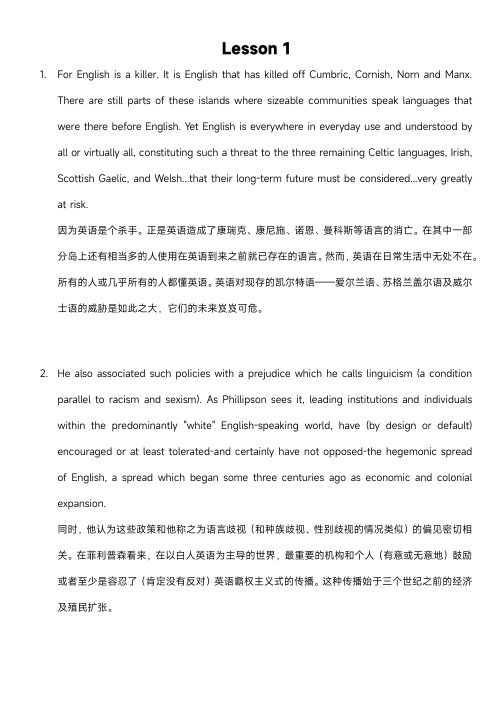
Lesson 11.For English is a killer. It is English that has killed off Cumbric, Cornish, Norn and Manx.There are still parts of these islands where sizeable communities speak languages that were there before English. Y et English is everywhere in everyday use and understood by all or virtually all, constituting such a threat to the three remaining Celtic languages, Irish, Scottish Gaelic, and Welsh...that their long-term future must be considered...very greatly at risk.因为英语是个杀手。
正是英语造成了康瑞克、康尼施、诺恩、曼科斯等语言的消亡。
在其中一部分岛上还有相当多的人使用在英语到来之前就已存在的语言。
然而,英语在日常生活中无处不在。
所有的人或几乎所有的人都懂英语。
英语对现存的凯尔特语——爱尔兰语、苏格兰盖尔语及威尔士语的威胁是如此之大,它们的未来岌岌可危。
2.He also associated such policies with a prejudice which he calls linguicism (a conditionparallel to racism and sexism). As Phillipson sees it, leading institutions and individuals within the predominantly "white" English-speaking world, have (by design or default) encouraged or at least tolerated-and certainly have not opposed-the hegemonic spread of English, a spread which began some three centuries ago as economic and colonial expansion.同时,他认为这些政策和他称之为语言歧视(和种族歧视、性别歧视的情况类似)的偏见密切相关。
研究生英语阅读教程(基础级3版)课文复习资料翻译1-12单元完整版

1..1.a . , , . . ,a , , , ... ... .因为英语是个杀手。
正是英语造成了康瑞克、康尼施、诺恩、曼科斯等语言的消亡。
在其中一部分岛上还有相当多的人使用在英语到来之前就已存在的语言。
然而,英语在日常生活中无处不在。
所有的人或几乎所有的人都懂英语。
英语对现存的凯尔特语——爱尔兰语、苏格兰盖尔语及威尔士语的威胁是如此之大,它们的未来岌岌可危。
2. a (a ). , "" , ( ) —— , a .同时,他认为这些政策和他称之为语言歧视(和种族歧视、性别歧视的情况类似)的偏见密切相关。
在菲利普森看来,在以白人英语为主导的世界,最重要的机构和个人(有意或无意地)鼓励或者至少是容忍了(肯定没有反对)英语霸权主义式的传播。
这种传播始于三个世纪之前的经济及殖民扩张。
3. , , . ,a .总的来说,我们现在或多或少地把这些语言看作有利的语言。
在谈到与之相关的文化及其为世界所做的贡献时,我们常怀有崇敬与赞赏,而且这样做也没有太大的风险,因为这些语言现在已不会构成什么威胁。
4. a . , a , a , a .然而,许多人把英语看成是一件幸事。
在此,我暂且不谈任何世界语言所具有的明显优势,例如广泛的通信网,强大的文化传媒体系,及强有力的文化教育机构。
5. , , , .讲英语的南非英国后裔并不强烈反对种族隔离政权,而黑人反对力量,其成员讲多种语言,在初期软弱无力且缺乏组织。
6. 's .这一象征表明这种世界通用语的使用者应充分发掘这一幸事为我们带来的好处,同时尽能避免招来灾难。
21 . I , I .苹果公司发生的这些事情丝毫的没有改变这一点。
我被驱逐了,但是我仍然钟爱我所做的事情。
2 a , ..因为,作为一个成功者的负重感被作为一个创业者的轻松感觉所重新代替, 没有比这更确定的事情了。
这让我觉得如此自由, 进入了我生命中最有创造力的一个阶段。
3 (可怕的好可怕糟糕的 ) i . a . 't . 这个良药的味道实在是太苦了,但是我想病人需要它。
贵州大学研究生英语阅读教程(基础级3版)课文答案翻译
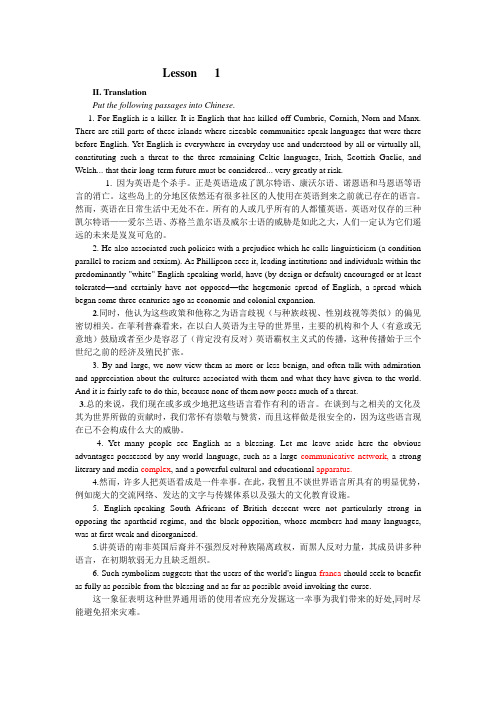
Lesson 1II. TranslationPut the following passages into Chinese.1. For English is a killer. It is English that has killed off Cumbric, Cornish, Norn and Manx. There are still parts of these islands where sizeable communities speak languages that were there before English. Yet English is everywhere in everyday use and understood by all or virtually all, constituting such a threat to the three remaining Celtic languages, Irish, Scottish Gaelic, and Welsh... that their long-term future must be considered... very greatly at risk.1. 因为英语是个杀手。
正是英语造成了凯尔特语、康沃尔语、诺恩语和马恩语等语言的消亡。
这些岛上的分地区依然还有很多社区的人使用在英语到来之前就已存在的语言。
然而,英语在日常生活中无处不在。
所有的人或几乎所有的人都懂英语。
英语对仅存的三种凯尔特语——爱尔兰语、苏格兰盖尔语及威尔士语的威胁是如此之大,人们一定认为它们遥远的未来是岌岌可危的。
2. He also associated such policies with a prejudice which he calls linguisticism (a condition parallel to racism and sexism). As Phillipson sees it, leading institutions and individuals within the predominantly "white" English-speaking world, have (by design or default) encouraged or at least tolerated—and certainly have not opposed—the hegemonic spread of English, a spread which began some three centuries ago as economic and colonial expansion.2.同时,他认为这些政策和他称之为语言歧视(与种族歧视、性别歧视等类似)的偏见密切相关。
《研究生英语阅读教程》(基础级)第三版课文译文
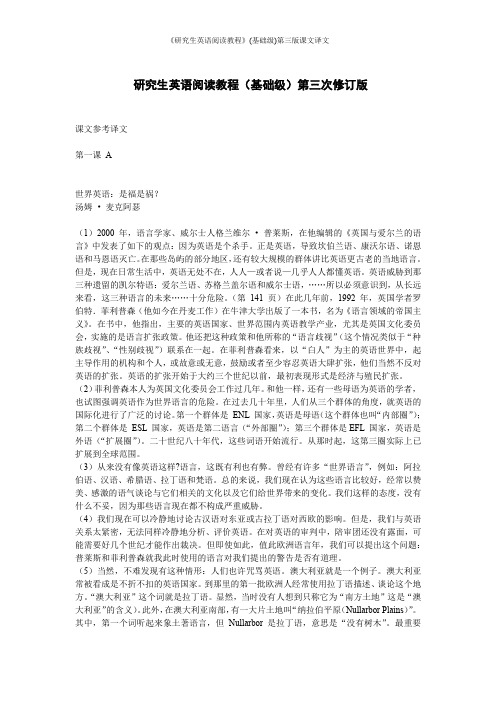
研究生英语阅读教程(基础级)第三次修订版课文参考译文第一课A世界英语:是福是祸?汤姆•麦克阿瑟(1)2000 年,语言学家、威尔士人格兰维尔•普莱斯,在他编辑的《英国与爱尔兰的语言》中发表了如下的观点:因为英语是个杀手。
正是英语,导致坎伯兰语、康沃尔语、诺恩语和马恩语灭亡。
在那些岛屿的部分地区,还有较大规模的群体讲比英语更古老的当地语言。
但是,现在日常生活中,英语无处不在,人人—或者说—几乎人人都懂英语。
英语威胁到那三种遗留的凯尔特语:爱尔兰语、苏格兰盖尔语和威尔士语,……所以必须意识到,从长远来看,这三种语言的未来……十分危险。
(第141 页)在此几年前,1992 年,英国学者罗伯特.菲利普森(他如今在丹麦工作)在牛津大学出版了一本书,名为《语言领域的帝国主义》。
在书中,他指出,主要的英语国家、世界范围内英语教学产业,尤其是英国文化委员会,实施的是语言扩张政策。
他还把这种政策和他所称的“语言歧视”(这个情况类似于“种族歧视”、“性别歧视”)联系在一起。
在菲利普森看来,以“白人”为主的英语世界中,起主导作用的机构和个人,鼓励或者至少容忍英语大肆扩张,他们当然不反对英语的扩张。
英语的扩张开始于大约三个世纪以前,最初表现形式是经济与殖民扩张。
(2)菲利普森本人为英国文化委员会工作过几年。
和他一样,还有一些母语为英语的学者,也试图强调英语作为世界语言的危险。
在过去几十年里,人们从三个群体的角度,就英语的国际化进行了广泛的讨论。
第一个群体是ENL 国家,英语是母语(这个群体也叫“内部圈”);第二个群体是ESL 国家,英语是第二语言(“外部圈”);第三个群体是EFL 国家,英语是外语(“扩展圈”)。
二十世纪八十年代,这些词语开始流行。
从那时起,这第三圈实际上已扩展到全球范围。
(3)从来没有像英语这样?语言,这既有利也有弊。
曾经有许多“世界语言”,例如:阿拉伯语、汉语、希腊语、拉丁语和梵语。
总的来说,我们现在认为这些语言比较好,经常以赞美、感激的语气谈论与它们相关的文化以及它们给世界带来的变化。
研究生英语阅读教程第三版基础级翻译答案Lesson16
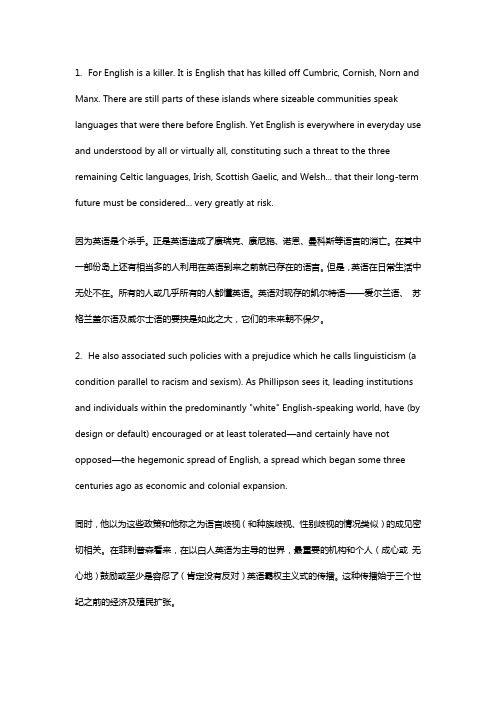
1.For English is a killer. It is English that has killed off Cumbric, Cornish, Norn and Manx. There are still parts of these islands where sizeable communities speak languages that were there before English. Yet English is everywhere in everyday use and understood by all or virtually all, constituting such a threat to the three remaining Celtic languages, Irish, Scottish Gaelic, and Welsh... that their long-term future must be considered... very greatly at risk.因为英语是个杀手。
正是英语造成了康瑞克、康尼施、诺恩、曼科斯等语言的消亡。
在其中一部份岛上还有相当多的人利用在英语到来之前就已存在的语言。
但是,英语在日常生活中无处不在。
所有的人或几乎所有的人都懂英语。
英语对现存的凯尔特语——爱尔兰语、苏格兰盖尔语及威尔士语的要挟是如此之大,它们的未来朝不保夕。
2.He also associated such policies with a prejudice which he calls linguisticism (a condition parallel to racism and sexism). As Phillipson sees it, leading institutions and individuals within the predominantly "white" English-speaking world, have (by design or default) encouraged or at least tolerated—and certainly have not opposed—the hegemonic spread of English, a spread which began some three centuries ago as economic and colonial expansion.同时,他以为这些政策和他称之为语言歧视(和种族歧视、性别歧视的情况类似)的成见密切相关。
(完整版)研究生英语阅读教程第三版课文Lesson1

Lesson 1 Spillonomics: Underestimating Risk[1] In retrospect, the pattern seems clear. Years before the Deepwater Horizon rig blew, BP was developing a reputation as an oil company that took safety risks to save money. An explosion at a Texas refinery killed 15 workers in 2005, and federal regulators and a panel led by James A. BakerⅢ, the former secretary of state, said that cost cutting was partly to blame. The next year, a corroded pipeline in Alaska poured oil into Prudhoe Bay. None other than Joe Barton, a Republican congressman from Texas and a global-warming skeptic, upbraided BP managers for their “seeming indifference to safety and environmental issues”.[2] Much of this indifference stemmed from an obsession with profits, come what may. But there also appears to have been another factor, one more universally human, at work. The people running BP did a dreadful job of estimating the true chances of events that seemed unlikely—but that would bring enormous costs.[3] Perhaps the easiest way to see this is to consider what BP executives must be thinking today. Surely, given the expense of the clean-up and the hit to BP’s reputation, the executives wish they could go back and spend the extra money to make Deepwater Horizon safer. That they did not suggests that they figured the rig would be fine an itwas.[4]For all the criticism BP executives may deserve, they are far from the only people to struggle with such low-probability, high-cost events. Nearly everyone does. “These are precisely the kinds of events that are hard for us as humans to get our hands around and react to rationally, ”Robert N. Stavins, an environmental economist at Harvard, says. We make two basic—and opposite—types of mistakes. When an event is difficult to imagine, we tend to underestimate its likelihood. This is the proverbial black swan. Most of the people running Deepwater Horizon probably never had a rig explode on them. So they assumed it would not happen , at least not to them.[5] Similarly, Ben Bernanke and Alan Greenspan liked to argue, not so long ago, that the national real estate market was not in a bubble because it had never been in one before. Wall Street traders took the same view and built mathematical models that did not allow for the possibility that house prices would decline. And may home buyers signed up for unaffordable mortgages, believing they could refinance or sell the house once its price rose. That’s what house prices did, it seemed.[6]On the other hand, when an unlikely event is all too easy to imagine, we often go in the opposite direction and overestimate the odds. After the 9/11 attacks, Americans canceled plane trips and took to the road. There were no terrorist attacks in this country in 2002, yet theadditional driving apparently led to an increase in traffic fatalities.[7]When the stakes are high enough, it falls to government to help its citizens avoid these entirely human errors. The market, left to its own devices, often cannot do so. Yet in the case of Deepwater Horizon, government policy actually went the other way. It encouraged BP to underestimate the odds of a catastrophe.[8] In a little-noticed provision in a 1990 law passed after the Exxon Valdez spill, Congress capped a spiller’s liability over and above cleanup costs at $7500 million for a rig spill. Even if the party is on the hook for only $7500 million. (In this instance, BP has agreed to waive the cap for claims it deems legitimate. ) Michael Greenstone, an M.I.T. economist who runs the Hamilton Project in Washington, says the law fundamentally distorts a company’s decision making. Without the cap, executives would have to weigh the possible revenue from a well against the cost of drilling there and the risk of damage. With the cap, they can largely ignore the potential damage beyond cleanup costs. So they end up drilling wells even in places where the damage can be horrific, like close to a shoreline. To put it another way, human frailty helped BP’s executives underestimate the chance of a low-probability, high-cost event. Federal law helped them underestimate the costs.[9] In the wake of Deepwater Horizon, Congress and Obama administration will no doubt be tempted to pass laws meant to reducethe risks of another deep-water disaster. Certainly there are some sensible steps they can take, like lifting the liability cap and freeing regulators from the sway of industry. But it would be foolish to think that the only risks we are still underestimating are the ones that have suddenly become salient.[10]The big financial risk is no longer a housing bubble. Instead, it may be the huge deficits that the growth of Medicare, Medicaid and Social Security will cause in coming years—and the possibility that lender will eventually become nervous about extending credit to Washington. True, some economists and policy makers insist the country should not get worked up about this possibility, because lenders have never soured on the Unite States government before and show no signs of doing so now. but isn’t that reminiscent of the old Bernanke-Greenspan tune about the housing market?[11]Then, of course, there are the greenhouse gases that oil wells ( among other things) send into the atmosphere even when the wells function properly. Scientists say the buildup of these gases is already likely to warm the planet by at least three degrees over the next century and cause droughts, storms and more ice-cap melting. The researcher’s estimates have risen recently, too, and it is also possible the planet could get around 12 degree hotter. That kind of could flood major cities and cause parts of Antarctica to collapse.[12]Nothing like that has ever happened before. Even imagining it is difficult. It is much easier to hope that the odds of such an outcome are vanishingly small. In fact, it’s only natural to have this hope. But that doesn’t make it wise.。
研究生英语阅读教程(基础级)第三版课后习题答案Lesson1

研究生英语阅读教程(基础级)第三版课后习题答案Lesson1Unit OneWorld English: A Blessing or a Curse (p7)1. There has been much opposition from social groups, B from the farmingcommunity.A. straightforwardly(直接地)B. notably(显著地,尤其)C. virtually(事实上)D. exceptionally(例外地)译文:社会团体,尤其是农业团体,对此有许多反对意见。
2. The A view in Britain and other Western countries associates aging with decline, dependency, isolation, and often poverty.A. predominant(占支配地位的)B. credulous(轻信的)C. inclusive(包含的)D. sustainable(可持续的)译文:英国和其他西方国家的主流观点认为,老龄化意味着衰落、依赖、孤立,而且往往是贫穷。
3. But gifts such as these cannot be awarded to everybody, either by judges or by the most D of governments.A. tough(困难的)B. demanding(苛求的)C. diverse(不同的)D. benign(有利的;善良的)译文:但是,这样的礼物不可能由法官或最仁慈的政府颁发给所有人。
4. The foreman read the C of guilty fourteen times, one foreach defendant.A. prejudice(偏见)B. verification(政审)C. verdict(判断;裁决)D. punishment(惩罚)译文:陪审团念了十四遍有罪判决,为每位被告都念了一遍。
研究生英语阅读教程(基础级)第三版-课后习题答案-Lesson-1-2-4-6-8-11-12
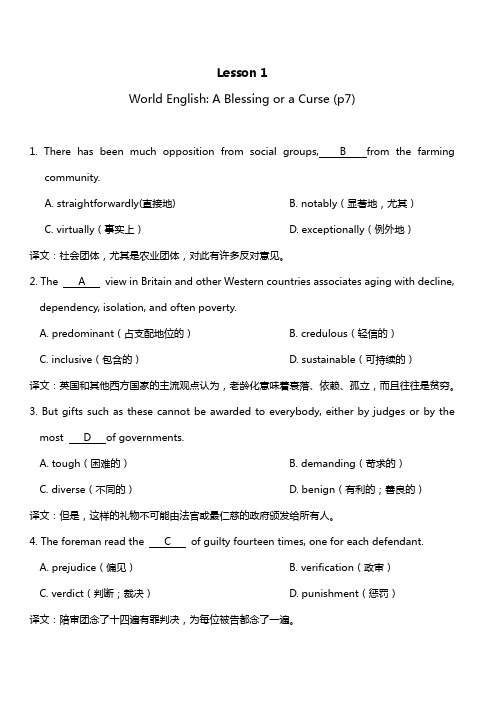
Lesson 1World English: A Blessing or a Curse (p7)1. There has been much opposition from social groups, B from the farmingcommunity.A. straightforwardly(直接地)B. notably(显著地,尤其)C. virtually(事实上)D. exceptionally(例外地)译文:社会团体,尤其是农业团体,对此有许多反对意见。
2. The A view in Britain and other Western countries associates aging with decline, dependency, isolation, and often poverty.A. predominant(占支配地位的)B. credulous(轻信的)C. inclusive(包含的)D. sustainable(可持续的)译文:英国和其他西方国家的主流观点认为,老龄化意味着衰落、依赖、孤立,而且往往是贫穷。
3. But gifts such as these cannot be awarded to everybody, either by judges or by the most D of governments.A. tough(困难的)B. demanding(苛求的)C. diverse(不同的)D. benign(有利的;善良的)译文:但是,这样的礼物不可能由法官或最仁慈的政府颁发给所有人。
4. The foreman read the C of guilty fourteen times, one for each defendant.A. prejudice(偏见)B. verification(政审)C. verdict(判断;裁决)D. punishment(惩罚)译文:陪审团念了十四遍有罪判决,为每位被告都念了一遍。
研究生英语阅读教程第三版(基础级)翻译答案Lesson1-6精编版
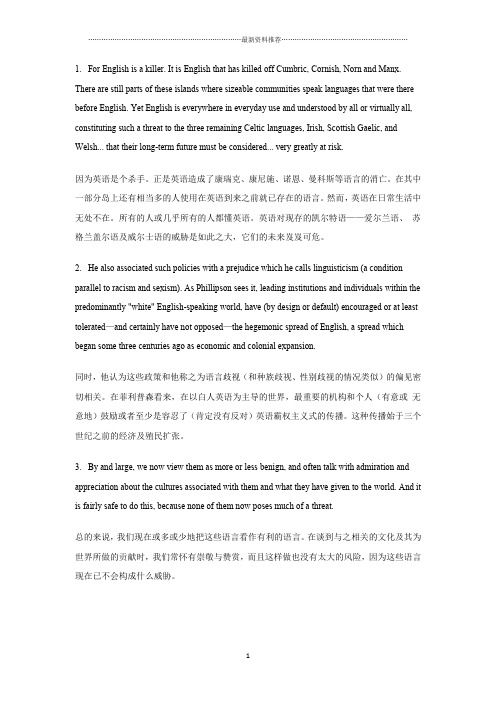
1.For English is a killer. It is English that has killed off Cumbric, Cornish, Norn and Manx. There are still parts of these islands where sizeable communities speak languages that were there before English. Yet English is everywhere in everyday use and understood by all or virtually all, constituting such a threat to the three remaining Celtic languages, Irish, Scottish Gaelic, and Welsh... that their long-term future must be considered... very greatly at risk.因为英语是个杀手。
正是英语造成了康瑞克、康尼施、诺恩、曼科斯等语言的消亡。
在其中一部分岛上还有相当多的人使用在英语到来之前就已存在的语言。
然而,英语在日常生活中无处不在。
所有的人或几乎所有的人都懂英语。
英语对现存的凯尔特语——爱尔兰语、苏格兰盖尔语及威尔士语的威胁是如此之大,它们的未来岌岌可危。
2.He also associated such policies with a prejudice which he calls linguisticism (a condition parallel to racism and sexism). As Phillipson sees it, leading institutions and individuals within the predominantly "white" English-speaking world, have (by design or default) encouraged or at least tolerated—and certainly have not opposed—the hegemonic spread of English, a spread which began some three centuries ago as economic and colonial expansion.同时,他认为这些政策和他称之为语言歧视(和种族歧视、性别歧视的情况类似)的偏见密切相关。
研究生英语阅读教程(第三版)课后翻译

TranslationLesson11. For English is a killer. It is English that has killed off Cumbric, Cornish, Norn and Manx. There are still parts of these islands where sizeable communities speak languages that were there before English. Yet English is everywhere in everyday use and understood by all or virtually all, constituting such a threat to the three remaining Celtic languages, Irish, Scottish Gaelic, and Welsh... that their long-term future must be considered... very greatly at risk.因为英语是个杀手。
正是英语造成了康瑞克、康尼施、诺恩、曼科斯等语言的消亡。
在其中一部分岛上还有相当多的人使用在英语到来之前就已存在的语言。
然而,英语在日常生活中无处不在。
所有的人或几乎所有的人都懂英语。
英语对现存的凯尔特语:爱尔兰语、苏格兰盖尔语及威尔士语的威胁是如此之大,它们的未来岌岌可危。
2. He also associated such policies with a prejudice which he calls linguisticism (a condition parallel to racism and sexism). As Phillipson sees it, leading institutions and individuals within the predominantly "white" English-speaking world, have (by design or default) encouraged or at least tolerated—and certainly have not opposed—the hegemonic spread of English, a spread which began some three centuries ago as economic and colonial expansion.同时,他认为这些政策和他称之为语言歧视(和种族歧视、性别歧视的情况类似)的偏见密切相关。
研究生英语阅读教程(基础级)第三版-课后习题答案-Lesson-8
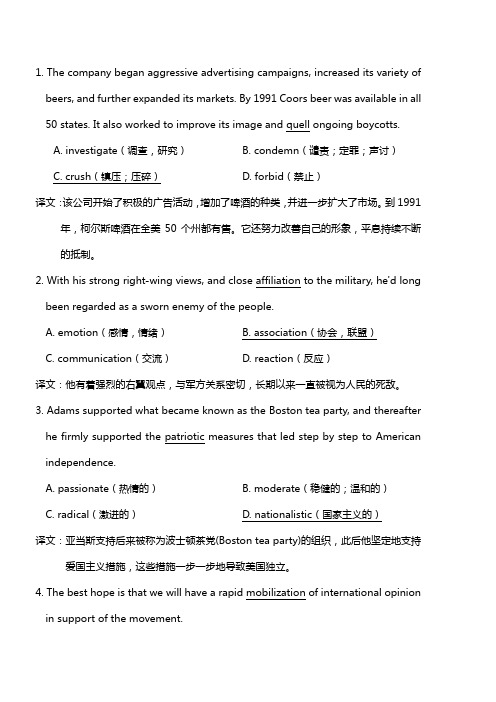
1. The company began aggressive advertising campaigns, increased its variety of beers, and further expanded its markets. By 1991 Coors beer was available in all50 states. It also worked to improve its image and quell ongoing boycotts.A. investigate(调查,研究)B. condemn(谴责;定罪;声讨)C. crush(镇压;压碎)D. forbid(禁止)译文:该公司开始了积极的广告活动,增加了啤酒的种类,并进一步扩大了市场。
到1991年,柯尔斯啤酒在全美50个州都有售。
它还努力改善自己的形象,平息持续不断的抵制。
2. With his strong right-wing views, and close affiliation to the military, he'd long been regarded as a sworn enemy of the people.A. emotion(感情,情绪)B. association(协会,联盟)C. communication(交流)D. reaction(反应)译文:他有着强烈的右翼观点,与军方关系密切,长期以来一直被视为人民的死敌。
3. Adams supported what became known as the Boston tea party, and thereafter he firmly supported the patriotic measures that led step by step to American independence.A. passionate(热情的)B. moderate(稳健的;温和的)C. radical(激进的)D. nationalistic(国家主义的)译文:亚当斯支持后来被称为波士顿茶党(Boston tea party)的组织,此后他坚定地支持爱国主义措施,这些措施一步一步地导致美国独立。
研究生英语阅读教程(基础级)第三次修订版课文参考译文
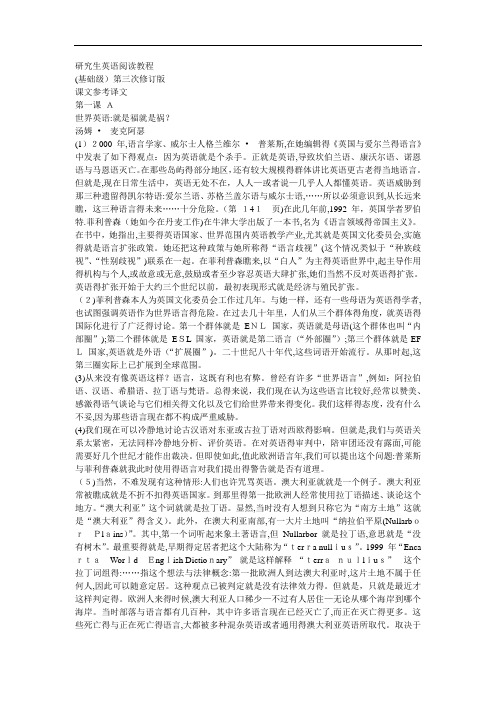
研究生英语阅读教程(基础级)第三次修订版课文参考译文第一课A世界英语:就是福就是祸?汤姆•麦克阿瑟(1)2000 年,语言学家、威尔士人格兰维尔•普莱斯,在她编辑得《英国与爱尔兰得语言》中发表了如下得观点:因为英语就是个杀手。
正就是英语,导致坎伯兰语、康沃尔语、诺恩语与马恩语灭亡。
在那些岛屿得部分地区,还有较大规模得群体讲比英语更古老得当地语言。
但就是,现在日常生活中,英语无处不在,人人—或者说—几乎人人都懂英语。
英语威胁到那三种遗留得凯尔特语:爱尔兰语、苏格兰盖尔语与威尔士语,……所以必须意识到,从长远来瞧,这三种语言得未来……十分危险。
(第141页)在此几年前,1992 年,英国学者罗伯特.菲利普森(她如今在丹麦工作)在牛津大学出版了一本书,名为《语言领域得帝国主义》。
在书中,她指出,主要得英语国家、世界范围内英语教学产业,尤其就是英国文化委员会,实施得就是语言扩张政策。
她还把这种政策与她所称得“语言歧视”(这个情况类似于“种族歧视”、“性别歧视”)联系在一起。
在菲利普森瞧来,以“白人”为主得英语世界中,起主导作用得机构与个人,或故意或无意,鼓励或者至少容忍英语大肆扩张,她们当然不反对英语得扩张。
英语得扩张开始于大约三个世纪以前,最初表现形式就是经济与殖民扩张。
(2)菲利普森本人为英国文化委员会工作过几年。
与她一样,还有一些母语为英语得学者,也试图强调英语作为世界语言得危险。
在过去几十年里,人们从三个群体得角度,就英语得国际化进行了广泛得讨论。
第一个群体就是ENL国家,英语就是母语(这个群体也叫“内部圈”);第二个群体就是ESL 国家,英语就是第二语言(“外部圈”);第三个群体就是EF L国家,英语就是外语(“扩展圈”)。
二十世纪八十年代,这些词语开始流行。
从那时起,这第三圈实际上已扩展到全球范围。
(3)从来没有像英语这样?语言,这既有利也有弊。
曾经有许多“世界语言”,例如:阿拉伯语、汉语、希腊语、拉丁语与梵语。
- 1、下载文档前请自行甄别文档内容的完整性,平台不提供额外的编辑、内容补充、找答案等附加服务。
- 2、"仅部分预览"的文档,不可在线预览部分如存在完整性等问题,可反馈申请退款(可完整预览的文档不适用该条件!)。
- 3、如文档侵犯您的权益,请联系客服反馈,我们会尽快为您处理(人工客服工作时间:9:00-18:30)。
研究生英语阅读教程(基础级)第三次修订版课文参考译文第一课A世界英语:是福是祸?汤姆•麦克阿瑟(1)2000 年,语言学家、威尔士人格兰维尔•普莱斯,在他编辑的《英国与爱尔兰的语言》中发表了如下的观点:因为英语是个杀手。
正是英语,导致坎伯兰语、康沃尔语、诺恩语和马恩语灭亡。
在那些岛屿的部分地区,还有较大规模的群体讲比英语更古老的当地语言。
但是,现在日常生活中,英语无处不在,人人—或者说—几乎人人都懂英语。
英语威胁到那三种遗留的凯尔特语:爱尔兰语、苏格兰盖尔语和威尔士语,……所以必须意识到,从长远来看,这三种语言的未来……十分危险。
(第141 页)在此几年前,1992 年,英国学者罗伯特.菲利普森(他如今在丹麦工作)在牛津大学出版了一本书,名为《语言领域的帝国主义》。
在书中,他指出,主要的英语国家、世界范围内英语教学产业,尤其是英国文化委员会,实施的是语言扩张政策。
他还把这种政策和他所称的“语言歧视”(这个情况类似于“种族歧视”、“性别歧视”)联系在一起。
在菲利普森看来,以“白人”为主的英语世界中,起主导作用的机构和个人,或故意或无意,鼓励或者至少容忍英语大肆扩张,他们当然不反对英语的扩张。
英语的扩张开始于大约三个世纪以前,最初表现形式是经济与殖民扩张。
(2)菲利普森本人为英国文化委员会工作过几年。
和他一样,还有一些母语为英语的学者,也试图强调英语作为世界语言的危险。
在过去几十年里,人们从三个群体的角度,就英语的国际化进行了广泛的讨论。
第一个群体是ENL 国家,英语是母语(这个群体也叫“内部圈”);第二个群体是ESL 国家,英语是第二语言(“外部圈”);第三个群体是EFL 国家,英语是外语(“扩展圈”)。
二十世纪八十年代,这些词语开始流行。
从那时起,这第三圈实际上已扩展到全球范围。
(3)从来没有像英语这样?语言,这既有利也有弊。
曾经有许多“世界语言”,例如:阿拉伯语、汉语、希腊语、拉丁语和梵语。
总的来说,我们现在认为这些语言比较好,经常以赞美、感激的语气谈论与它们相关的文化以及它们给世界带来的变化。
我们这样的态度,没有什么不妥,因为那些语言现在都不构成严重威胁。
(4)我们现在可以冷静地讨论古汉语对东亚或古拉丁语对西欧的影响。
但是,我们与英语关系太紧密,无法同样冷静地分析、评价英语。
在对英语的审判中,陪审团还没有露面,可能需要好几个世纪才能作出裁决。
但即使如此,值此欧洲语言年,我们可以提出这个问题:普莱斯和菲利普森就我此时使用的语言对我们提出的警告是否有道理。
(5)当然,不难发现有这种情形:人们也许咒骂英语。
澳大利亚就是一个例子。
澳大利亚常被看成是不折不扣的英语国家。
到那里的第一批欧洲人经常使用拉丁语描述、谈论这个地方。
“澳大利亚”这个词就是拉丁语。
显然,当时没有人想到只称它为“南方土地”这是“澳大利亚”的含义)。
此外,在澳大利亚南部,有一大片土地叫“纳拉伯平原(Nullarbor Plains)”。
其中,第一个词听起来象土著语言,但Nullarbor 是拉丁语,意思是“没有树木”。
最重要的是,早期的定居者把这个大陆称为“terra nullius”。
1999 年“Encarta World English Dictionary”是这样解释“terra nullius”这个拉丁词组的:……指这个想法和法律概念:第一批欧洲人到达澳大利亚时,这片土地不属于任何人,因此可以随意定居。
这种观点已被判定是没有法律效力的。
但是,只是最近才这样判定的。
欧洲人来的时候,澳大利亚人口稀少—不过有人居住—无论从哪个海岸到哪个海岸。
当时部落和语言都有几百种,其中许多语言现在已经灭亡了,而正在灭亡的更多。
这些死亡的和正在死亡的语言,大都被多种混杂英语或者通用的澳大利亚英语所取代。
取决于你的立场,这或者是令人哀伤的损失,或者是进步的代价。
(6)但是,同时有一个问题:土著语言的灭亡能完全归咎于英语吗?最早发现澳大利亚的欧洲人是荷兰人,他们的语言本可以成为殖民与定居中使用的语言。
任何定居者的语言都可能有同样的作用。
例如,如果蒙古人能维持他们幅员辽阔的欧亚帝国,蒙古语可能就会成为世界语言,传播到澳大利亚。
再例如,如果历史有一些变化,那么今天世界语言可能是阿拉伯语。
如今,阿拉伯语在西亚和北非是一种强大的语言,影响到许多其它较小的语言,包括科普特语和柏柏尔语。
西班牙语对所谓“拉丁”美洲的土著语言产生了消极影响,而俄语从欧洲传到西伯利亚太平洋地区。
如果英语是个祸害,是个杀手,那可能仅仅是因为任何大的语言都可能会影响到、威胁到较小的语言。
(7)但许多人认为英语是有益的。
我这里暂不讨论任何世界语言具有的明显优势,例如:交流网络庞大、文学与传媒体系发达、文化与教育机构强大。
让我们看看与此不同的问题:政治、公平与平等。
这里我用南非为例来说明。
十年前,南非结束了种族隔离为原则的统治。
在南非语(这种语言来源于荷兰语)中,这种制度叫“apartheid”。
出现这种制度,是因为欧洲血统的南非人群体—血统主要是荷兰的欧洲定居者—认为自己优于他们建立殖民地的当地人。
(8)说英语的、英国裔的南非人不是非常积极反对种族隔离制度。
黑人的反对力量中,成员使用多种语言,他们起初缺少力量与组织。
但是,使这种反对力量增强、更有组织的语言是英语。
对于他们来说,英语成为自由与团结的主要语言,而不是用来压迫的语言。
今天,南非有十一种官方语言--英语、南非语和九种当地语言,包括祖鲁、恩德比利语和塞茨瓦纳语。
但这九种语言中,南非黑人使用(或准备使用)哪一种作为本国通用语言呢?除了母语之外,他们希望子女还能熟练讲、写哪种呢?答案是,哪一种也不是。
他们所希望的是英语,而且他们特别希望有与非洲相适宜的英语。
(9)所以,对于澳大利亚土著人来说,是个祸害,而对南非的土著人来说,却有一些好处。
……(10)那么,在当今全球化而多样性受到威胁的世界里,我们应该怎样看待英语?在我看来,答案似乎很清楚。
与很多事物一样,英语有时是福、有时是祸—对于个人、群体、国家甚至国家联盟,都是如此。
东亚“阴”、“阳”的象征意义也许能很好地说明这个问题。
阴中有阳,阳中有阴。
两者虽相反,但共存。
就我们这里的问题来说,指的是在同一交流圈内。
这种象征意义说明,使用世界通用语言的人应该努力尽可能用其利而避其弊。
第一课B一大堆相矛盾的语言忌讳蒂莫西•基弗(1)2002 年初,位于美国西北部的华盛顿州引起媒体轰动。
当时,该州通过法律,禁止在官方场合使用“Oriental(东方的)”这个词语。
而应该使用“Asian(亚洲的)”这个词。
这个新法律只禁止用“Oriental(东方的)”指人。
所以,有一个法律提到“少数民族”包括“Orientals (东方人)”,这就要改成“Asians(亚洲人)”而另一法律提到“Oriental medicine(东方医学)”则不变。
该法律的提案人是韩裔美国人、州参议员保罗•信,他说这个法律通过的原因是,“Oriental(东方的)”是“贬义词”,“令人厌恶”。
(2)“Oriental”来源于拉丁语的“oriens”,意思是“升起的太阳”或“东方”。
因为亚洲位于欧洲以东,Oriental”就有了“亚洲的”意思。
“The Orient”、Far East”和“East Asia”这三个名词词组,都是指亚洲大陆的东部。
具有讽刺意味的是,俄罗斯东部通常不在东方和东亚所指的含义之内,尽管俄罗斯向东部延伸范围比其它任何欧亚大陆的国家都远。
(3)信先生和其他批评“Oriental”这个词的人认为,这个词令亚洲人厌恶,因为它暗示出一种以欧洲为中心的世界观。
在美国的太平洋海岸,即华盛顿州所在位置,所谓的“Oriental (东方)”是在西面,不在东面。
(4)这个论点的问题是:有许多被广泛接受的地理词汇来源于这类过时的世界观。
我的家乡是威斯康星州,那里属于被称为“中西部”的地区。
但我住在美国东部地区。
出现这个词语,是因为人们是自东向西定居美国的。
对于十八世纪末、十九世纪初从大西洋海岸开始定居的人,任何在阿帕拉契亚山以西的东西都被看成是“西部”。
(5)不久以前,欧洲人和美国人还愿意使用“Near East(近东)”这个词来指从埃及到伊朗的这片区域。
近几十年来,Middle East(中东)”已经取而代之。
这两个词语和“Far East(远东)”或“Orient(东方)”一样,只有把欧洲作为参照物时才有意义。
(6)在这方面,其它语言和英语一样糟糕。
阿拉伯世界以西奈半岛为界,把自己分成Maghrib (西方)和Mashriq(东方)两部分。
具有讽刺意味的是,把古代世界分成亚洲和欧洲两个部分,这可能是希腊人从腓利基人(今天黎巴嫩人的祖先)那里借用来的。
其实,“欧洲”和阿拉伯的“Maghrib”很可能来源于闪米特族的同一个词根,意思是“太阳落下”。
中国满不在乎地自称是“中央之国”,对于这样的文明,我们能说什么呢?(7)在这样的语言问题上要求精确,这或许有些过分。
无论认为“Oriental(东方人)”一词令人厌恶,这是否有道理,在过去的几十年中,该词已经渐渐不被用来指亚洲人或亚裔美国人了。
在今天的英语中,用“Oriental(东方人)”一词来指人时,往好了说,听起来过时,往坏了说,则有贬义。
(8)然而,虽然说一个人是“东方人”也许不再妥当,但该词在指物的很多短语中仍是标准用法。
例如,“东方地毯”指通常从土耳其或中亚进口的地毯,它们的价格极贵( 通常是数千美元),受到青睐。
(9)英语中还有许多其它显然具有矛盾倾向的、与种族相关的词。
“中国城(Chinatown)”意思是中国移民居住的地区,是个恰当的词语。
但是,用Chinaman 指中国人,这在二十世纪上半叶的美国,可就令人厌恶,尽管该词是从“中国人”一词直接翻译来的。
而“Frenchman”,意思是法国人,则完全是个中性的词语。
(10)美国佬在说到亚洲人时必须采取的小心态度,与说到撒哈拉沙漠以南非洲人后裔的美国人时所需要的精心考虑相比,那算不了什么,因为说到后者时就像走过地雷阵。
“Colored person( 有色人)”一词现在令人厌恶,然而在美国国内战争(1861—1865) 之后一百年中的大部分时间内,却被认为是个文明的词语。
而另一方面,“person of color( 有色人)”,指任何非欧洲种族的人,却是可以接受的词语,而且在某些意识形态的圈子内,是一个受欢迎的词语。
用来指美国黑人的“Negro”( 西班牙语“黑”的意思),在二十世纪六十年代让位于“black( 黑人)”或者“Black”,但到了八十年代又被“Afro-American”( 非洲裔美国人) 所取代,到了90 年代又让位于“African-American(非洲裔美国人)”或者“African American”。
